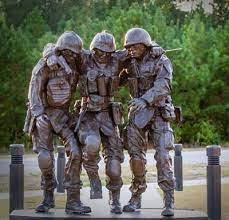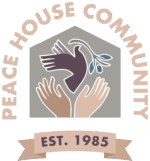
Never having been in the armed forces, I don’t have personal experience with the idea of leaving no one behind on the battlefield, even if rescuing them requires great personal risk. I understand it in concept, but I’ve never had to live it out. Only recently did I realize that I get to see others live it out every day that I come to Peace House Community.
Many of our community members make decisions that confound anyone from a middle class background. They decline housing opportunities, or move into housing and then get kicked out for inviting all their friends from the street to stay with them. They get into fights with their best friends and the next day act like nothing happened. They buy, sell and barter items from each other in a system that often looks like a giant commune. Most confusing of all, they stick with friends who they know are dragging them down.
I hear so many questions that start with “Why don’t they …”, as if people who have never lived on the streets know what the community members should do. The questions are usually well-meaning, but they say more about the questioner’s ignorance than about the best way to escape the streets. Knowing how to live on a moderate income in a reasonably safe neighborhood doesn’t mean much to someone with almost no income who faces predators, dealings and pimps every day.
The answer to “Why don’t they …” usually comes down to friendship, or at least community. Those who have little are forced to rely more on others than those who have enough to take care of themselves. When they are at their neediest, they are more likely to get help from people who understand their position than from others who have an excess but who don’t grasp the seriousness of the situation. Paradoxically, PHC’s community members often get their protection and security from the same streets that threaten them. By establishing and maintaining their friendships, the community provides for each other in a way that completely baffles people from the suburbs.
All of this means that those who struggle financially or are homeless will often turn down the opportunity to “escape” when it is offered. They realize that they can leave, but they will be leaving others behind who cared for them when they were at the lowest point in their lives. Like those in the military, they reject the idea that they can leave others behind in order to protect themselves. Often, this decision leads to tragic results.
On the other hand, it highlights what is most noble in humans, and provides an example to the rest of us. We are constantly tempted to worry about ourselves and our own needs, and only help others from our leftovers. Seeing the devotion and sacrifice that those who have little are willing to make for each other can help us overcome that temptation, and finally to become a better version of ourselves.
[For two ways of looking at this issue, see Paul Piff’s TED Talk about how money makes you mean and Five Finger Death Punch’s song The Wrong Side of Heaven]
by Marti Maltby, Director Peace House Community – A Place to Belong
This article originally appeared in “The Alley,” the newspaper for the Phillips neighborhood of Minneapolis.
